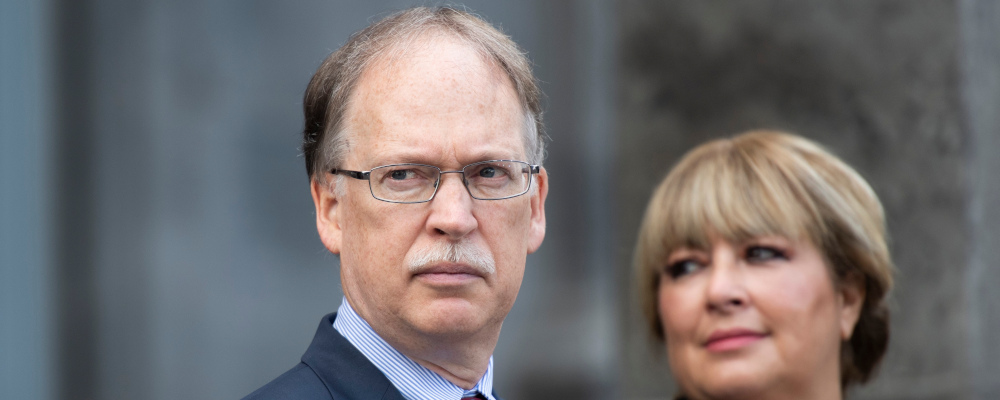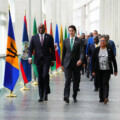HAMILTON, ON – The fact that few knew that Ian Shugart was a regular gospel preacher in many Ottawa churches leads to a fitting way to describe the man. Ian rose to be the head of Canada’s public service, some 300-thousand people strong. He was a quick mind with steady judgement and an observer of character. He was cautious, wise, and thorough—a model public servant. Mostly though, and especially as he travelled the vocational path to the highest position in the civil service as clerk of the Privy Council, he was a pastor. By that, I mean he always looked for the person behind the professional. In the most straightforward way, he got to the heart of things. He had an eye for things that matter to the heart without losing sight of the job at hand.
I met Ian in 2011 as part of the Advisory Council for Social Innovation. He sat two chairs away from me. He seemed quite at ease to be invisible until he spoke. When I listened to him speak my internal voice exclaimed, “I know that language.” I know the careful wording about human dignity, I know the language of respect, and I know the language of history and wisdom. Simply, I knew right then he was a man of faith. I left the meeting, quickly jumped on to Google, and to my great surprise the first entry on Ian Shugart was a faith-filled speech he presented at the very think tank I worked for, Cardus.
Not long after that meeting, I was waiting in a government boardroom as part of the long cadre of people deputy ministers meet in a day. Ian walked into the boardroom and said “You know I am a founder of your organization.” With discernable disbelief in my eyes, I listened as he shared that he was part of the early group of Parliament Hill staffers that founded the Centre for Cultural Renewal (which is now a part of Cardus.)
Since that day we have met many times for more than a decade. Our deal was this. First, let’s not do day-to-day politics, but let’s talk about ideas that matter—and we did that. The second was: don’t ask me to share what you know I can’t—and I didn’t. Only one time did I catch a glimpse behind the scenes. It was a very public scandal that clearly landed on his plate to fix. I was teasing him about his easy life and his eyes went wide and frustration lines reshaped his face, for maybe a second. He never wavered from his commitment to respecting confidentiality.
In the last few years as clerk and then as a senator, Ian paid special attention to the emerging leaders in the Cardus community. As he weakened, his words had a growing intimacy and urgency to them. He spoke less of strategy and more of character and faithfulness. I watched these future leaders—young men and women—allow the voice of Ian Shugart to burn into their hearts and set their trajectory of public service.
I know from Ian’s own words and worldview that he was deeply concerned about the cultural and spiritual direction of the country he served. Despite his deep concern, he stubbornly remained a public servant in its purest form. Ian would often remind me, “Michael, worry more about the cultural and spiritual state of yourself, your neighbour, and your community. Politicians will follow the culture and the public servant must serve the government. And that is as it ought to be!” Many times I imagined what power a deputy minister could exert by bending an issue in my direction. But here, Ian Shugart was in the tradition of Saint Thomas More, known as the virtuous statesman who never used the means of power to advance a matter of personal interest.

I miss Ian Shugart. Just as the prime minister gave him space to truly voice the wisdom of a Godly and wise man, cancer was breaking his earthly form. I had dared to imagine tackling legislative files with mutual mission.
When I think about Ian, I can’t help but think of another ancient public servant from the Christian and Jewish Scriptures: the prophet Daniel. Daniel, who spent time in the lions’ den, served in the courts of Babylon all while staying true to his own faith. I know my long-time friend and Cardus co-founder Ray Pennings often saw parallels between the prophet Daniel and Ian. And Ian himself deeply studied the model of Daniel as a faithful leader and public servant. It’s a model worth following and one I hope others take to heart.
Ian faced the brokenness of the world, including cancer, while holding to a hopeful future. I have no doubt that the words he hears today are, “Well done, good and faithful servant. Come and share your Master’s happiness.”
Recommended for You

Ginny Roth: J.D. Vance, Pierre Poilievre, and how they slice their economic pie

David Polansky: As President Biden leaves the race, will the Democratic Party hodgepodge hold?

RCMP spending to protect MPs may have risen 112% since 2018, as Canadian politicians face greater rise in threats

Trevor Tombe: Canadians are paying billions in hidden taxes on new homes










